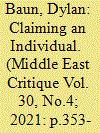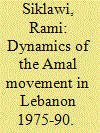|
|
|
Sort Order |
|
|
|
Items / Page
|
|
|
|
|
|
|
| Srl | Item |
| 1 |
ID:
162410


|
|
|
|
|
| Summary/Abstract |
The Black Saturday massacre that took place on 6 December 1975 in Beirut, Lebanon, marked the first large-scale targeting of Lebanese civilians during the Lebanese civil war. The magnitude of the violence committed on that day set the precedent to outbursts of violence between December 1975 and June 1976, namely the Battle of the Hotels, and the Karantina and Damour massacres which were retaliatory in nature. The circumstances surrounding the massacre remain tied to one individual in particular, Joseph Sa`adeh, who initiated the massacre upon learning of the death of his son. Considering that the construction of the Lebanese civil war narrative remains one of the most politically contested and sensitive processes in Lebanon to date, this article examines where personal motivations, grievances and convictions fit in historiographical practices, which are often centred on actions themselves, and are dismissive of the vast personal negotiations that build up to them. The article therefore offers a deeper examination of Lebanese civil war historiography, by stitching together the voices of both fighters and civilians. In doing so, the article also challenges the linear trajectories of war narratives in Lebanon that lend themselves easily to epistemological labels of sectarianism, and often ignore the arbitrariness of people's behaviour in times of extreme stress.
|
|
|
|
|
|
|
|
|
|
|
|
|
|
|
|
| 2 |
ID:
181812


|
|
|
|
|
| Summary/Abstract |
Imad Nuwayhid (1944–1975) was a young Lebanese leftist intellectual, hotel employee, and fighter for the Lebanese Communist Party. Alongside thousands of others, he died during the first phase of the Lebanese Civil War (1975–1976). This article explores Imad’s life, death, and legacy through the methodology of ‘Microhistory.’ Consulting Imad’s writings alongside party sources, and conducting interviews with those who knew him, it serves as a window into the politics of memorialization in the Lebanese Civil War with a focus on the Lebanese Left. It argues that multiple actors, ranging from party to family members, produced Imad’s ‘martyr narrative.’ Like others of the era, regardless of party, the narrative stressed ideology and sacrifice over individuality to mobilize the living to fight. These strategies did not, however, unfold without resistance. In the case of Imad, some family challenged the party, positing counter-narratives and claiming Imad as theirs: a Nuwayhid. Their actions seek to restore Imad as an individual, but not always as he lived. These findings contribute to the literature on the Lebanese Civil War and its memory, providing a personal touch through a new and novel level of analysis: the individual, their sources, and the battle over memory that surrounds them.
|
|
|
|
|
|
|
|
|
|
|
|
|
|
|
|
| 3 |
ID:
112442


|
|
|
| 4 |
ID:
191514


|
|
|
|
|
| Summary/Abstract |
This article offers an analysis of women’s profiles, pathways, and motivations to join the Lebanese civil war (1975 to 1990), with a particular focus on female fighters militants involved with Harakat Amal, Kataeb, the Progressive Socialist Party, Lebanese Communist Party, Fatah and the Popular Front for the Liberation of Palestine. The article contributes to existing debates on women’s motivations to join nonstate armed groups by examining both militias that included female fighters and those that did not. It is the first study so far that analyses the profiles and motivations of female fighters and militants within all major militias during the Lebanese civil war.
|
|
|
|
|
|
|
|
|
|
|
|
|
|
|
|
| 5 |
ID:
122593


|
|
|
|
|
| Publication |
2013.
|
| Summary/Abstract |
In 1976 Syria intervened militarily in the Lebanese Civil War in support of the Lebanese Right and against its traditional allies, the Leftist-Palestinian alliance. Scholars have debated what role the United States, and particularly President Gerald Ford and Secretary of State Henry Kissinger, played in Syria's actions. Some scholars argue the U.S. government lured Syria into Lebanon; others argue the Syrian intervention was proposed by Syrian President Hafez al-Asad to the United States. Recently declassified documents support the latter, and demonstrate that the U.S. government initially opposed Syria's proposal for fear that it would trigger a war with Israel. The Ford administration ultimately supported the Syrian occupation of Lebanon, however, because it sought to marginalize the PLO and the militias of Leftist leader Kamal Jumblatt, which challenged America's perceived Cold War interests. This approach accomplished short-term U.S. policy goals, but it did not tend toward solving the region's long-term problems.
|
|
|
|
|
|
|
|
|
|
|
|
|
|
|
|
| 6 |
ID:
181284


|
|
|
|
|
| Summary/Abstract |
Lebanese political dynamics are often characterized by political confessionalism, neo-liberal economics, corruption, and its particularity as an Arab state with Western social orientations. Although these characterizations may seem, at times, contradictory, this article argues that they are part of a political structure that initially developed during the Civil War (1975–1990) that was sustained by Lebanon’s post-conflict power sharing agreement. This article builds on the critiques present in the developing scholarship on post-conflict power sharing, demonstrating how dynamics established as a consequence of the Civil War continued into the post-conflict period. This has led to the reproduction of sectarian boundary inflammation, limitations on democratic and civil society mobilisation, and political stagnation. The article concludes with an analysis of the 2015 Garbage Crisis as exemplary of sustained Civil War dynamics and the consequent constraints on civil society mobilisation caused by these dynamics.
|
|
|
|
|
|
|
|
|
|
|
|
|
|
|
|
| 7 |
ID:
182563


|
|
|
|
|
| Summary/Abstract |
The experiences of irregular combatants and the psychosocial impact of their participation in violent conflict are poorly understood in comparison to the body of research available on military veterans in developed countries. The Lebanese civil war (1975–1990) was an archetypal intra-national armed conflict, involving thousands of civilians turned fighters. Fifteen former fighters were interviewed about their active involvement in the war. The qualitative analysis reveals a persistent psychosocial burden decades later. Former paramilitary fighters have needs that overlap only partially with those of regular veterans. Further research on this population would be beneficial to global peacebuilding efforts and conflict prevention.
|
|
|
|
|
|
|
|
|
|
|
|
|
|
|
|
| 8 |
ID:
147589


|
|
|
|
|
| Summary/Abstract |
This analysis examines the efforts by the Palestine Liberation Organisation [PLO] to formalise relations with the United States before and after the October 1973 Arab–Israeli War. It details the public and private attempts by PLO Chairman Yasir Arafat to present the organisation as a legitimate partner for negotiations with Israel. However, the American secretary of state and national security advisor, Henry Kissinger, hindered the PLO’s diplomatic initiatives during the Richard M. Nixon and Gerald R. Ford administrations. Kissinger viewed the PLO as an impediment to his efforts to resolve the Arab–Israeli conflict through separate peace agreements, rather than a comprehensive solution. Despite Washington’s objections to the PLO, the organisation had regional and international legitimacy, its stature aided by its political and ideological allies. Yet these ties also contributed to the PLO’s involvement in the Lebanese civil war. Kissinger encouraged Syria’s June 1976 invasion of Lebanon to weaken, if not destroy, the PLO as an independent actor. Although the PLO survived Syria’s intervention, Kissinger’s actions and agreements limited the diplomatic initiatives of the Jimmy Carter Administration.
|
|
|
|
|
|
|
|
|
|
|
|
|
|
|
|
| 9 |
ID:
142752


|
|
|
|
|
| Summary/Abstract |
This study explores the use of a web of concepts as an analytical tool for investigating a movement's ideology. It locates wilayat al-faqih [guardianship of the jurisprudent] in Hizballah's web of concepts and identifies how wilayat al-faqih has been defined and used throughout the organization's history. Hizballah's web has always included a mix of Islamic, quasi-Islamic, and non-Islamic concepts. Wilayat al-faqih has been a source of legitimacy and authority for Hizballah and a unifying concept within the movement. Claiming allegiance to it has resulted in material and ideological support from Iran. However, the radical change in the national context required Hizballah to re-articulate the concept upon the end of the Lebanese Civil War. The death of Khomeini and intellectual contributions by Shia scholars enabled Hizballah leaders to separate political from religious authority and to decentralize the political power of wilayat al-faqih. By modifying the concept, Hizballah leaders were able to continue their revolutionary mission in a new way and in a new context.
|
|
|
|
|
|
|
|
|
|
|
|
|
|
|
|
|
|
|
|
|